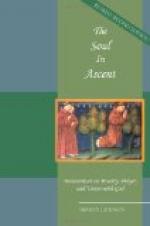But growth is not all. The voices to which we choose to give heed will sound most distinctly in our ears. Here we face a fact which is often in evidence. The earth and animalism will never cease to make appeal to our senses, while at the same time voices from above will call from their heights to our spirits. To distinguish between desire and duty, between truth and tradition, between the spiritual and the animal, is a step which has to be taken, and which is taken whether we appreciate how or not. By the pain which follows wrong choices, or by the intuitions of the spirit, the soul comes to realize that its obligation is always in one direction; that its choice ought to be in favor of the morally excellent. But how shall it discern the morally excellent? The process of learning will be a long one, and never fully completed on the earth. This is a realm that poets and dramatists, who are usually the profoundest and most accurate students of life, have not often tried to enter. Such questions can be answered only after careful and long-continued inductive study. Moralists are usually content to stop short of this inquiry. How the soul comes to learn that it is obligated to truth and right we may not fully know; but that it does learn, and that no step in all its development is more important, there is no doubt. In His dealing with this question Jesus preserves the same attitude as toward all subjects of speculation. I came not to explain how life adjusts itself to its environment, He seems to say, but to give life a richness and a beauty which it never had before; I came not to answer questions, but to save to the best uses that which already exists. Nevertheless, the question as to how the soul is taught to distinguish the morally excellent is of serious importance. If we do not recognize the sanctity of truth and right we may not give them hospitality; and we may not appreciate their sanctity if we are ignorant of what gives them their authority. How, then, does it learn what truth and right are? Are there any clearly defined paths by which this knowledge may be reached? Is not truth a matter of education? And is there any absolute right? A Hindoo Swami, of the school of the Vedanta, lecturing in this country, solemnly assured an intelligent audience that there is no sin; that what is called sin is only the result of education; that what is vice in one place may be virtue in another; and that in the sphere of morals all is relative and nothing absolute. Then there is no wrong, for wrong and sin are closely related; and no right because if right is not a dream it implies the possibility of an opposite. There is little permanent danger from such shallow theories. The peril from confusion is greater than from denial. But even confusion at this point is not long necessary because in every soul there is a voice which men call conscience, which never fails to impel toward the true and the good. Conscience may be likened to a compass whose needle




